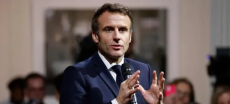[vc_row][vc_column][vc_column_text dp_text_size=”size-4″]Mr. Trump has been charged with unauthorised possession of secret material, obstruction of justice, hiding documents, and making false statements to law enforcement on 37 counts. Each of these crimes carries significant fines as well as the risk of years in prison. While many Republicans view the indictment as a partisan witch hunt, several legal experts believe it makes a good case.
“It’s a slam dunk,” Diana Florence, a former Manhattan District Attorney’s Office prosecutor, told the BBC.
“Here’s why: it contains everything. It has videos. It has discussions that have been recorded. It has lower-level staff testifying.”
Here are some of the most significant revelations and why they may be harmful.
Missing documents included nuclear secrets
The indictment’s most dramatic section outlines the 31 documents Mr. Trump is accused of having at his Florida estate, Mar-a-Lago.
They include information on US nuclear weapons programmes, potential vulnerabilities of the US and its allies, and US plans for military retaliation.
According to the indictment:
“The release of these classified documents could jeopardise US national security, foreign relations, the safety of US military and human sources, and the viability of sensitive intelligence collection methods.”
That’s a significant claim, considering that prosecutors will have to show that Mr Trump illegally obtained secret national defence information in order to prove his charges under the Espionage Act.
The specifics of the documents might be politically detrimental to Mr. Trump as well.
Republicans, including some of Mr Trump’s presidential opponents, rushed to his defence as word of the indictment came on Thursday.
Also Read: NASA’s Psyche mission will launch this autumn to an unknown metal world.
While they may still object to what they see as a politically motivated prosecution, they may find it more difficult to explain why Mr Trump retained such sensitive national security information after leaving the White House.
Trump showed US military plans to visitors
According to the indictment, Mr. Trump was willing to display secret documents to people who did not have necessary security clearances in two specific occasions.
The first involves a recording of the former president speaking to a writer, a publisher, and two members of his staff on July 21, 2021.
He briefed them about a secret US strike plot against an unnamed country that is thought to be Iran.
“Trump told the individuals that the plan was ‘highly confidential’ and’secret,'” according to the indictment. ‘As president, I could have declassified it,’ Trump added, and ‘Now, I can’t, you know, but this is still a secret.”
The other is an account of a meeting with a political assistant in August or September 2021, at which Mr Trump showed the individual a classified map of another country and told them that a military operation there was not going well.
The first episode calls into question one of the former president’s main defences to the charges: that he declassified all evidence before leaving the White House.
It also highlights Mr. Trump’s apparent carelessness with classified information, which he used to make points in casual conversation.
‘What if we don’t play ball with them?’ Trump questioned his counsel.
The alleged mishandling of secret documents is merely one aspect of Mr Trump’s case. Other charges include obstruction of justice and lying to and deceiving investigators.
One of Mr Trump’s lawyers, Jim Trusty, called the case as “ludicrous” and the charges as a “kind of crazy stretch” on Thursday evening.
However, according to the accusation, Mr Trump authorised the transit and storage of the boxes of documents from the start.
Prosecutors claim he was “personally involved” in the packing of the White House crates.
He was tracing the boxes’ movements while federal authorities sought their return.
And he wanted to be in the room as his lawyers combed through the contents of boxes for secret information.
According to the claims, Donald Trump stole US nuclear secrets.
Could Donald Trump face prison time for accessing classified information?
See where Trump is said to have kept classified documents.
The indictment also claims he had boxes moved from storage to his Mar-a-Lago house without the knowledge of his attorneys, and that he had classified documents carried to his golf club in New Jersey before to the Mar-a-Lago search.
According to the complaint, when aides asked Mr Trump what they should tell federal investigators, he told them to lie.
The indictment includes video surveillance footage, text messages and images from Trump aides, employees, and family members, as well as witness evidence, to back up these charges.
According to Trump Attorney 1, one of Mr Trump’s lawyers, the former president said the following to investigators:
I don’t want anyone looking through my boxes, and I especially don’t want you looking through my boxes.
So, what if we don’t answer at all or don’t play ball with them?
Isn’t it better just to tell them we don’t have anything?
Isn’t it preferable if there aren’t any documents?
“The most difficult challenge in these cases is proving intent,” says David Super, a law professor at Georgetown University.
“However, the indictment contains a massive amount of very specific information demonstrating Mr Trump’s personal awareness and involvement, including his proposal that various statements to investigators be made that he knew were false.”
The prosecution has now sketched out its case against Mr. Trump. However, the indictment is only the beginning. Now, special counsel Jack Smith and his team must prove their claims in court, in front of a jury in Florida.[/vc_column_text][/vc_column][/vc_row]











